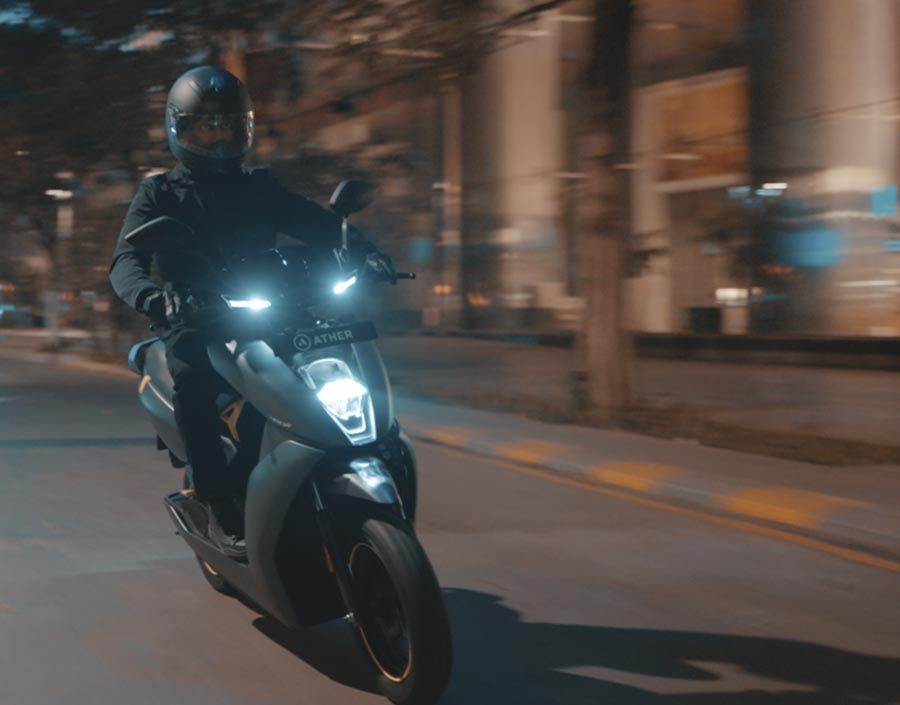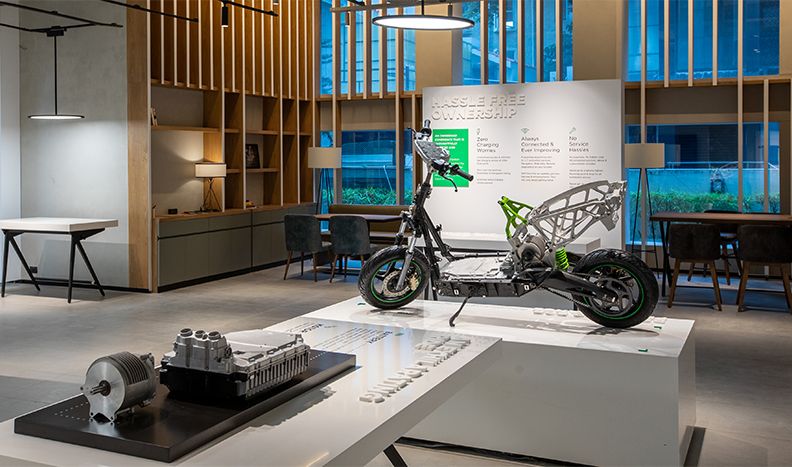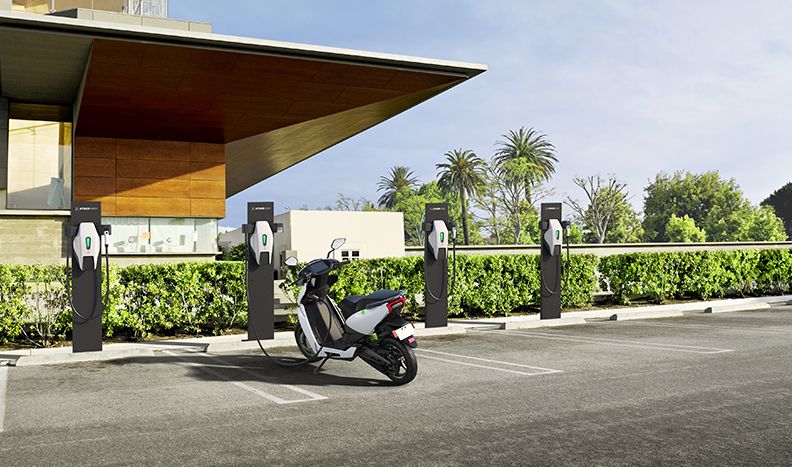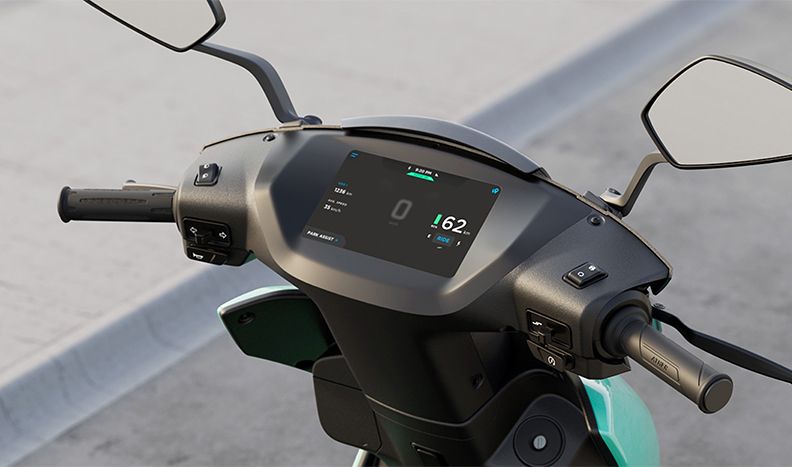Smart, Green Technology Is Changing the Way India Rides
Electric Scooter Reduces CO2 Emissions and Cures “Range Anxiety”
For Ram Panchapakesan, a proud Ather Energy scooter owner, gliding through the streets of Bangalore with his wife and a bag of groceries comfortably aboard his Ather 450 is only one of the many pleasures his smart scooter brought to his life. A seasoned rider at the age of 52, Panchapakesan writes in a forum for Ather 450 owners that his two-wheeler gives him the confidence and joy of being a 25-year-old again. More than just a weekend joy ride, two-wheelers like the Ather 450 are a necessity and a way of life for many riders like Panchapakesan across Bangalore and the coastal city of Chennai.
“A connected and intelligent vehicle enables us to do important things that aren’t imaginable with a regular scooter.”

An Ather 450x zips through the streets of Bangalore.
There are roughly 5 million two-wheel scooters in metropolitan Bangalore, comprising 70% of all vehicles in the city. When it comes to flexibility, speed, and independence, two-wheelers have found their way into the hearts of riders across the country. Yet, despite their popularity, intelligent and sustainable options are severely lacking.
In 2013 Ather’s cofounders Swapnil Jain and Tarun Mehta set out to solve that problem.
“We wanted to design a vehicle that will become more than just a mode of commute,” said Jain. “The Ather 450 is designed to be a platform for mobility. A connected and intelligent vehicle enables us to do important things that aren’t imaginable with a regular scooter.”
Humble Beginnings
Both recent alumni of the Indian Institute of Technology Madras, Mehta and Jain launched Ather in 2013 as a solution to India’s sustainable vehicle problem. Although they are more fuel efficient than cars, the sheer number of scooters in use in India means they contribute heavily to greenhouse gases.
What started as barely a bike frame quickly grew in just three years into the company’s first scooter: the Ather S340. With a lithium-ion battery, lightweight aluminum body, and an intelligent digital display, the Ather S340 was a revolution in the smart scooter market. While that boded well for Ather’s foothold in the market, Jain said that striking out on their own path came with its unique challenges.

At Ather Space, the Ather immersive experience showroom, visitors and potential owners can view the inner workings of the 450, including the chassis, motor, and suspension.
“There have been multiple challenges, [such as] finding the right kind of people to work on something like this because there is no prior model to look to in the country,” said Jain. “And building of the technology—to be able to build such a product—has been challenging because people have gone through multiple iterations to figure out what is to be done and what cannot be done.”
Without MATLAB and Simulink to scale up the speed of their testing, Jain says it would’ve been impossible for Ather to grow as quickly as it did. Model-Based Design enabled virtual prototyping.
“With Model-Based Design, we identified and validated the best ideas through simulation, making it possible to deliver a more full-featured scooter in less time.”
“We had lots of promising ideas, but as a small startup, we did not have the time, money, or people to build prototypes to test each one,” says, Shivaram N.V., senior systems engineer at Ather. “With Model-Based Design, we identified and validated the best ideas through simulation, making it possible to deliver a more full-featured scooter in less time.”
In 2018 the company unveiled its most recent models, the Ather 340 and Ather 450, and in 2019 secured its fourth round of funding for $51 million USD.
What has really set Ather’s scooters apart is the intelligence that is baked directly into the system. Ather’s 450 scooter comes equipped with a touchscreen GPS, remote diagnostics based on data patterns of other users, and an intelligent battery that can autonomously change modes in different environments to ensure its highest efficiency and power.
“The vehicle has decision-making capability and a mind of its own.”
“We have forty-odd sensors across the vehicle that capture different types of data,” says Jain. “The battery has its own intelligence, same goes for the charger, same goes for the motor. The vehicle has decision-making capability and a mind of its own.”
These decisions include what to do about diagnostic data the scooters continuously stream back to Ather’s servers, says Jain. For example, if a vehicle is unable to charge, the scooters can perform their own analysis on data from this event as well as receive wireless intervention from Ather engineers if necessary. This predictive maintenance technique enables Ather to improve the scooter’s intelligence and even remotely update vehicles with new and improved features without the need to replace the bike itself.
With these features, Ather is hoping to make the transition from petrol-powered scooters to their 340 and 450 models as easy as possible for users. But to fully realize that vision, there’s still one more piece of the puzzle to solve, says Jain: charging.
More than Just a Scooter
Roadways and cities are littered with petrol and gas stations to fill up vehicles, but charging stations for electric vehicles and two-wheelers were significantly scarcer. Even though the Ather 450 is designed to drive 75 km (about 46 miles) on a single battery charge, without a proper charging infrastructure in place, users may succumb to something called “range anxiety”: a fear of being stranded if their vehicle’s battery dies.
Ather designed an intricate grid of charging points such that any user of its scooters is never further than 4 km (about 2.5 miles) away from a charger.
To remedy this problem, Ather designed an intricate grid of charging points such that any user of its scooters is never further than 4 km (about 2.5 miles) away from a charger. Jain says they were able to do this by anticipating places chargers might need to be placed for user convenience, such as apartment buildings, restaurants, and workplaces. Ather scooter users can navigate to 38 charging locations across Bangalore and 14 in Chennai using their scooter’s dashboard and charge their vehicle at up to 1 km/minute.
While designed with its scooters in mind, Ather’s charging points can also be used for other types of electric vehicles as well. Plans are underway to expand charging station availability into neighboring cities.

The Ather 450 charging at one of the 52 charging stations across Bangalore and Chennai.
The Road Ahead
Looking toward the future, Ather is already preparing to release its newest scooter model, the Ather 450X, with new smart features, a longer range, and a more powerful battery. Ather also plans to introduce a subscription model for its batteries.
Lithium-ion batteries notoriously suffer from a loss of charging capacity over their lifetime due to degradation within the battery. Ather has proposed for its Ather 450X scooters a battery subscription service in which the user owns the scooter but pays monthly for the battery. This way, whenever a user’s battery falls below 80% charging capacity, it can be replaced without an additional charge. This new model of service would extend the usable life of the entire scooter.
With Ather’s proposed battery subscription service, whenever a battery falls below 80% charging capacity, users can get a new one without additional charge.
As Ather continues to grow its technology, Jain says he hopes the company can continue to grow its impact on users as well.
“From here on its going to be on the one side scaling up what we have and on the other side bettering what we have,” said Jain. “[And learning] to bring in more intelligence on the vehicle… [will allow us] to make a much bigger impact than we have today.”
For Panchapakesan, this impact is already being felt. Whether whizzing through town in Sports Mode or smugly stopping at a fuel station to only fill the air in his Ather 450’s tires, Panchapakesan writes that his Ather scooter has already changed his life for the better.

The Ather 450X dashboard, with a seven-inch LCD touchscreen, incorporates navigation, and Bluetooth.